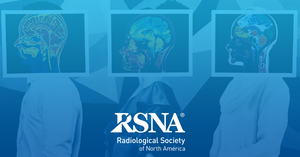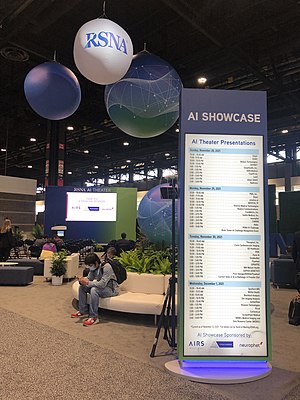Radiological Society of North America
This article has multiple issues. Please help improve it or discuss these issues on the talk page. (Learn how and when to remove these messages)
|


The Radiological Society of North America (RSNA) is a non-profit organization and an international society of radiologists, medical physicists and other medical imaging professionals representing 31 radiologic subspecialties from 145 countries around the world.[1] Based in Oak Brook, Illinois, it was established in 1915.
The Society hosts an annual conference in Chicago and develops educational resources such as courses, workshops and webinars. RSNA also publishes six peer-reviewed radiology journals, offers quality improvement tools,[2] sponsors research to advance quantitative imaging biomarkers,[3] and conducts outreach to enhance radiology education and patient care in low-income and middle-income countries.[4]
Annual meeting
[edit]RSNA hosts the world's largest annual[5] medical imaging conference,[6] a five-day event starting the last Sunday of November at the McCormick Place convention center in Chicago.
Journals
[edit]RSNA publishes six peer-reviewed journals:[7] Radiology,[8] offering radiology research and reviews; RadioGraphics,[9] dedicated to continuing education in radiology; Radiology: Artificial Intelligence,[10] highlights the emerging applications of machine learning and artificial intelligence in the field of imaging across multiple disciplines; Radiology: Cardiothoracic Imaging,[11] emphasizes research advances and technical developments in medical imaging that drive cardiothoracic medicine; Radiology: Imaging Cancer[12], covers the best clinical and translational cancer imaging studies across organ systems and modalities, including leading-edge technological developments; Radiology Advances[13], an open access journal focusing on the publication of a broad spectrum of high-quality international radiology and medical imaging research.
Case Collection
[edit]RSNA Case Collection[14] is an online resource of clinical cases intended to be used as an educational tool. Developed by and created for radiologists, RSNA Case Collection includes image-focused case reports from across radiology subspecialties and consists of images, relevant patient information, final and differential diagnoses, case discussions and references. All cases undergo careful peer review before they are assigned a DOI - allowing them to be fully citable.
RSNA Case Collection is supported by an active presence on X (formerly Twitter).
Imaging AI Certificate Program
[edit]The RSNA Imaging AI Certificate program[15] is a radiology-specific imaging AI certificate program that combines a case-based curriculum and on-demand learning with practical application.
The program is for radiologists, radiology residents, physicists, data scientists and clinical researchers who want to learn how to safely evaluate, implement, use and monitor performance of AI-based tools for medical imaging.
There are three courses currently available within the program: the Foundational Certificate course, the Advanced Certificate course and the Emergency Certificate course.
RadiologyInfo.org
[edit]Available in English and Spanish, RadiologyInfo.org[16] is the public information website developed and funded by RSNA and the American College of Radiology. It was established to inform and educate the general public about what radiology is and what radiologists do. Approximately half a million people visit RadiologyInfo.org each month[citation needed].
Research and Education Foundation
[edit]The RSNA R&E Foundation supports radiology research through grant funding, training opportunities and industry initiatives that advance innovation in radiology. The Foundation has awarded $84 million in grants since 1984.[17]
Board of Directors
[edit]Curtis P. Langlotz, MD, PhD, is the 2023-2024 president of RSNA's Board of Directors.[18]
References
[edit]- ^ "About". www.rsna.org. Retrieved 2022-03-09.
- ^ "Practice tools". www.rsna.org. Retrieved 2022-03-16.
- ^ "Quantitative Imaging Biomarkers Alliance". www.rsna.org. Retrieved 2022-03-09.
- ^ "Global Learning Centers". www.rsna.org. Retrieved 2022-03-09.
- ^ "Annual Meeting". www.rsna.org. Retrieved 2022-03-09.
- ^ "HCEA Ranks Top 50 Medical Meetings". MeetingsNet. 11 October 2013. Retrieved 2016-11-26.
- ^ "RSNA Publications Online | Home". RSNA Publications Online. Retrieved 2022-03-09.
- ^ "Radiology". Radiology.
- ^ "RadioGraphics". RadioGraphics.
- ^ "Radiology: Artificial Intelligence". Radiology: Artificial Intelligence.
- ^ "Radiology: Cardiothoracic Imaging". Radiology: Cardiothoracic Imaging.
- ^ "Radiology: Imaging Cancer". Radiology: Imaging Cancer.
- ^ "Radiology Advances". Radiology Advances.
- ^ "RSNA Case Collection". cases.rsna.org. Retrieved 2022-03-09.
- ^ "RSNA Imaging AI Certificate". www.rsna.org. Retrieved 2022-03-09.
- ^ "For Patients". Radiologyinfo.org. Retrieved 2022-03-09.
- ^ "Research". www.rsna.org. Retrieved 2022-03-09.
- ^ "RSNA Board of Directors". www.rsna.org. Retrieved 2021-03-02.
